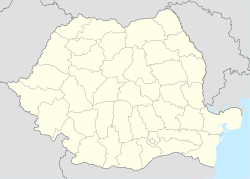Oradea
|
Oradea Nagyvárad |
|||
|---|---|---|---|
| City | |||
     
From left: Overview of the city center, Oradea City Hall, Greek Catholic Diocese Palace, Black Eagle Palace, Astoria Hotel, Roman Catholic Episcopal palace
|
|||
|
|||
| Location of Oradea | |||
| Coordinates: 47°04′20″N 21°55′16″E / 47.07222°N 21.92111°ECoordinates: 47°04′20″N 21°55′16″E / 47.07222°N 21.92111°E | |||
| Country |
|
||
| County | Bihor County | ||
| Government | |||
| • Mayor | Ilie Gavril Bolojan (National Liberal Party) | ||
| Area | |||
| • City | 115.56 km2 (44.62 sq mi) | ||
| Elevation | 142 m (466 ft) | ||
| Population (2011 census) | |||
| • City | 196,367 | ||
| • Rank | 10th (Romania) | ||
| • Density | 1,257/km2 (3,260/sq mi) | ||
| • Metro | 245,537 | ||
| Time zone | EET (UTC+2) | ||
| • Summer (DST) | EEST (UTC+3) | ||
| Postal code | 4101xx | ||
| Area code(s) | (+40) 59 | ||
| Vehicle registration | BH | ||
| Official language | Romanian | ||
| Recognized minority language | Hungarian | ||
| Patron saint | Saint Ladislaus | ||
| Climate | Dfb | ||
| Website | www |
||
Oradea (Romanian pronunciation: [oˈrade̯a]; German: Großwardein, Hungarian: Nagyvárad, Hungarian pronunciation: [nɒɟvaːrɒd], colloquially also Várad, former Turkish: Varat, Yiddish: גרויסווארדיין Groysvardeyn) the capital city of Bihor County and Crișana region, is one of the important centers of economic, social and cultural development in the western part of Romania, retaining these characteristics throughout history. The city is nestled between the hills that separate and unify in a harmonious way with plain Crișana. Located on the banks of Crișul Repede River, that divides the city into almost equal halves, it is the gateway to Central and Western Europe. The city is located in the north-west of Romania.
Located about 10 km (6.2 mi) from Borș, the most important crossing point on the west border (with Hungary), Oradea ranks tenth in size among Romanian cities; it covers an area of 11,556 hectares (28,560 acres). The city is at an altitude of 126 m above sea level, in the opening of the Criș valley and the plain area, in an area of contact between the extensions of the Apuseni Mountains and the extended plain Crișana-Banat. It lies as the area of transition from relief hills, to the Pannonian plain. City topoclimatic action is determined by the prevailing Western winds. Climate is Temperate Continental (Köppen climate classification Dfb), with some oceanic influences.
The city lies at the meeting point of the Crișana plain and the Crișul Repede's basin. It is situated 126 meters above sea level, surrounded on the north-eastern part by the hills of Oradea, part of the Șes hills. The main part of the settlement is situated on the floodplain and on the terraces situated down the river Crișul Repede. Oradea is famous for its thermal springs. The river Crişul Repede crosses the city right through the center, providing it with a picturesque beauty. Its flow depends on the season; the dykes near Tileagd have partly controlled it since they were built in the early 1980s.
...
Wikipedia



